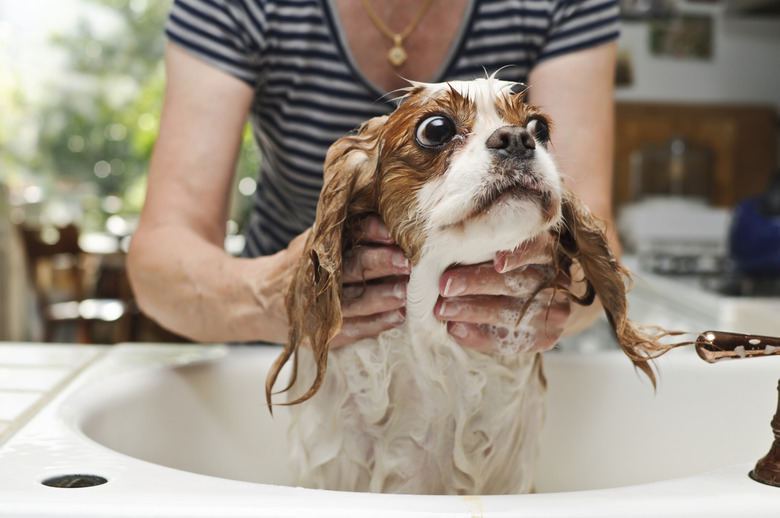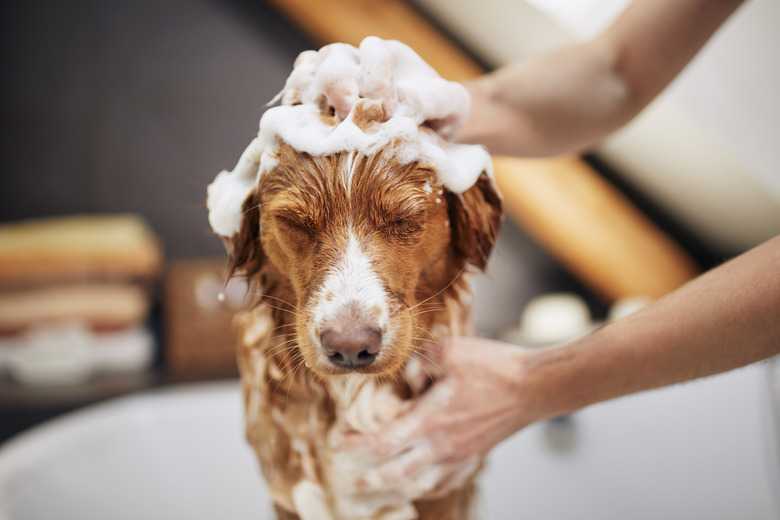Is Chlorhexidine Gluconate Safe For Dogs?
You can confidently use chlorhexidine gluconate for your dog as long as they don't display signs of irritation from use. This antiseptic has a wide margin of safety for dogs when highly diluted and used according to your veterinarian's directions. It works effectively against gram-plus and gram-negative bacteria; the dilution will vary based on the prescribed use. Commercially-available products are also generally very safe.
Chlorhexidine for dogs with skin issues
Chlorhexidine for dogs with skin issues
Chlorhexidine gluconate works as an effective antiseptic and is often prescribed to treat dermatitis and other bacterial or fungal skin conditions. It can be used to clean skin wounds and treat superficial skin infections. The concentration for a topical treatment should be no more than two percent to avoid irritating your dog's skin.
Chlorhexidine gluconate is also a widely-used ingredient in commercial dog shampoos. Your vet may recommend a medicated shampoo for your dog if they suffer from certain skin conditions, such as hot spots or acute moist dermatitis. You should always take your dog to the vet if you notice they have any skin problem for proper diagnosis and treatment.
Discontinue the use of medicated shampoo or chlorhexidine spray if you notice a rash or other irritation on your dog's skin. The irritation should clear up once you stop using the product.
Chlorhexidine gluconate for dogs with ear problems
Chlorhexidine gluconate for dogs with ear problems
Chlorhexidine gluconate's antibacterial properties and easy application make it an ideal ear infection treatment. There are many over-the-counter ear washes for dogs that contain chlorhexidine.
If your dog's ears are bothering them, you should take them to your veterinarian. Allergies, an ear infection, mites, or something else could be causing the irritation. Your vet will need to determine the cause of your dog's irritation before effectively treating it. Your veterinarian will also need to ensure that your dog's eardrum is intact before you put any type of ear wash, such as chlorhexidine solution for dogs into it.
Follow your veterinarian's treatment instructions. Your dog may need medication in addition to an ear wash to treat their problem. Finish all treatment prescribed by your veterinarian, even if your dog appears to be feeling better.
Chlorhexidine for your dog's oral health
Chlorhexidine for your dog's oral health
Your vet may prescribe a 0.1 percent chlorhexidine gluconate dilution for your dog's gingivitis or signs of periodontal disease. However, actually using chlorhexidine mouthwash for dogs might be difficult. Ask your vet for an applicator designed for canine oral health. You can also use gauze or just your fingers to ensure even application on the affected areas in your dog's mouth.
Alternatively, you can use a water additive for your dog. Water additives containing chlorhexidine are available for purchase over-the-counter. A water additive is a great addition to your dog's dental care routine; they can reap its benefits simply by drinking their water.
It's important to start your dog on a dental care routine as soon as you can. Prevention is the best way to deal with oral health issues, such as gingivitis and periodontal disease. Your dog's oral care routine should include regular teeth brushing at home with a toothpaste specifically formulated for dogs. Your veterinarian should also examine your dog's teeth at least once a year at their annual wellness visit. Regular dental cleanings at your vet's office are also important.
Precautions when using chlorhexidine solution for dogs
Precautions when using chlorhexidine solution for dogs
Chlorhexidine gluconate is generally considered safe for dogs. However, some dogs may react to it. You should not use chlorhexidine on a dog who is known to be allergic to it. It is always best to consult your veterinarian before using any new product, such as medicated shampoo or ear cleanser on your dog.


